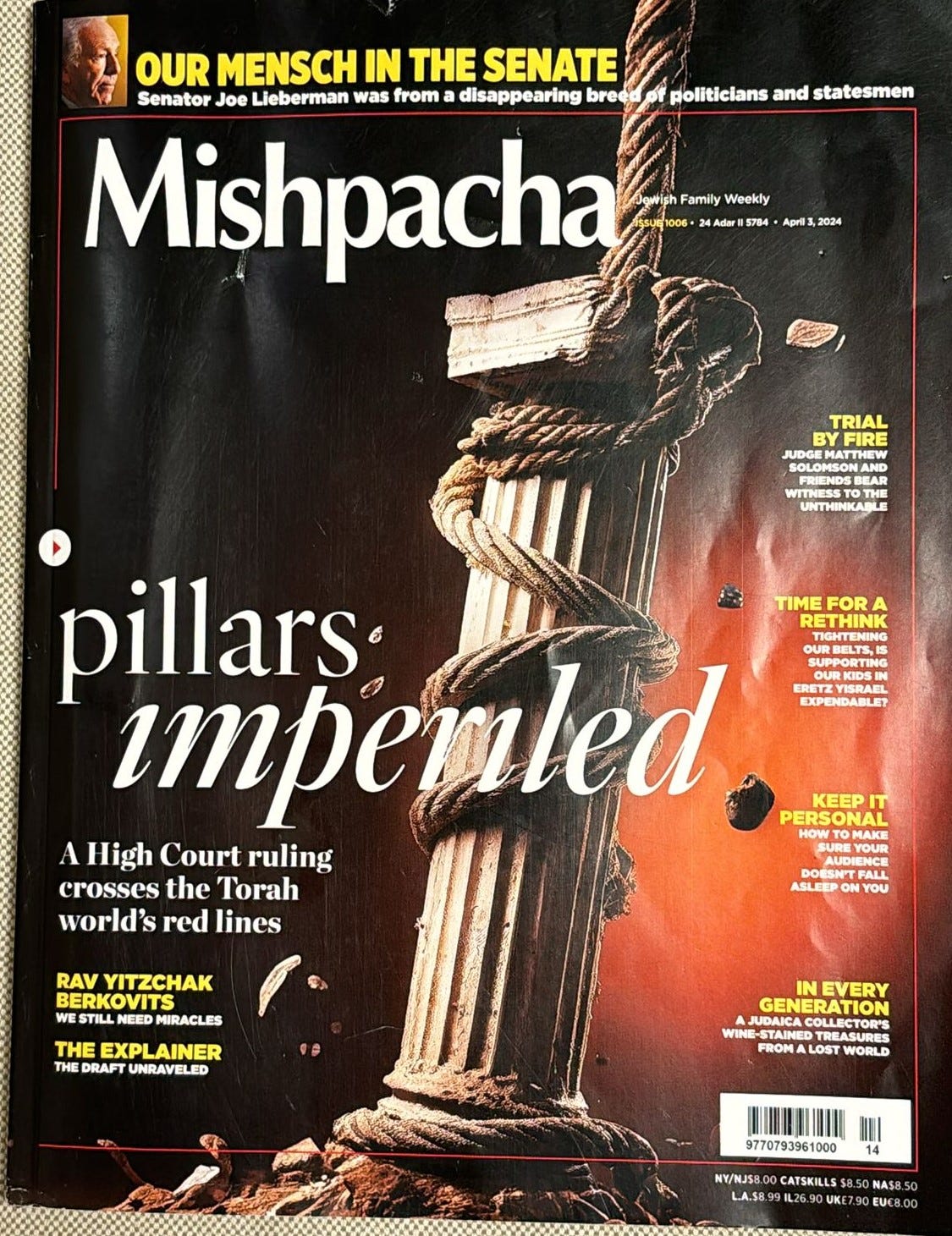Yeshivish vs. Charedi
The Great American Divide
I was taken aback to receive the following newsletter from Mishpacha magazine:
Regardless of where you live and who you know, the events of last Simchas Torah had an indelible impact on us as a nation.
We want to hear how you got through this year.
“Since the war broke out, I’ve personally raised thousands of dollars in aid for military families. It’s so incredible to see how we are one nation”
“I may live in Lakewood, but my heart is in Eretz Yisrael”
“I haven’t slept through the night since my son went up to fight”
“I lost my second cousin in a battle in Gaza. He was a new father with a heart of gold”
“I feel like I can finally understand the fear of my grandfather, a Holocaust survivor”
October 7 changed everything. For all of us. How has it impacted your life — your day-today, your hopes and fears, your actions, your worldview?
What has given you chizuk in this time — and how? What have you listened to, read, or watched that has moved you? Is there something new in your davening, or a new initiative you participate in?
Tell us about it in 150-250 words.
Email familyfirst@mishpacha.com, or visit mishpacha.com/oct7change by September 25, to participate in this project.
Raising money for military families rather than for yeshivos? Surely Rav Dov Landau and Rav Moshe Hillel Hirsch have condemned such things! And having a son going to fight?! Praising a cousin in combat?! This is anathema in charedi circles! And what war are they talking about, anyway - surely the only war to be discussed is the War On Torah!
Clearly there’s a large spectrum among the American “black hat” crowd. And the ones more to the right wouldn’t dream of even reading Mishpacha.
But the strange thing is that this is the very same magazine which has insisted that charedim should not serve in the IDF and which has gone all-out against those who would diverge from charedi Daas Torah.
In other words, many readers of this magazine are essentially non-charedi in their approach to life, but they identify as charedi!
The split identity among the American yeshivish-lite crowd is extraordinary.




This is no chiddush. A very large part of what in Eretz Yisroel would be called Charedi population in Flatbush, Monsey, Five Towns, even Lakewood, are NOT Charedi in Israeli terms. They may dress similar, speak similarly, but they are part of the taxpaying workforce, and while Torah is #1 they don't share the same value system as Israeli Charedim. They may not support the Israeli government 100% but they love every soldier, don't hate the chilonim, respect Hesder yeshivas even if they wouldn't send their own kids.. and they don't agree with across the board army exemption... hence why so many have not made aliya despite their love for eretz yisroel. And for many that have it has been socially difficult. They Look Chareidi but arent
Clearly the black hat community in the US does not correspond to the Charedi community in Israel, even if they dress similar. One of the reasons for this may be that the Modern Orthodox community in the US does not correspond to the Religious Zionist community in Israel, even if they dress similar.
I have heard people who identify as Modern Orthodox in North America state that in their mind the definition of MO is that you do not have to be so careful in Mitzva observance. A very significant percentage of people who identify as MO are not careful about specific mitzvot. There are entire communities where the weekday minyan is made up almost exclusively of people saying Kaddish, it is rare to see women who cover their hair, and things like separate swimming hours are almost unheard of.
This means that someone in America who is 100% committed to Halacha may not feel comfortable dressing like and identifying with a community that self-defines itself as lax in Halacha.
(I am well aware that serious MO institutions like Yeshiva University are no no way lax in Halachic observance, however YU does not reflect the norm in many MO communities).
In contrast, the Religious Zionist community in Israel does not define itself by mitzvot that they are lax in, the opposite, it defines itself by mitzvot that they have embraced more than the Charedi community. It is true that RZ includes a wide spectrum, from Dati-lite to Chardal, but someone who is extremely careful about Mitzva observance can find a community in the RZ spectrum where they will feel comfortable, and would not feel the need to wear a hat and jacket to differentiate themselves from a community which does not always embrace halacha the way they do.